Individualismo y corporativismo en el feminismo español, 1890-1937
DOI:
https://doi.org/10.30827/arenal.v16i1.1489Palabras clave:
Individualismo, Modernización, Actitudes individuales y colectivas, Corporativismo patriarcal, Corporativismo laboral, Feminismo político, Feminismo social, Mujeres y la Asamblea Nacional, Fuero del TrabajoResumen
En este trabajo la palabra corporativismo —frente a su acepción tradicional como principio de organización nacionalsindicalista de un Estado— es sinónimo de las adjetivaciones políticas que pueden acompañar a afirmaciones ideológicas no individualistas. El avance del individualismo desde principios del siglo XIX en los espacios feministas europeos, tuvo que enfrentarse en España con argumentos y actitudes anti-individualistas que habían enclaustrado a las mujeres en el secular corporativismo familiar-patriarcal de las clases acomodadas. De igual manera o en paralelo, en el mundo del trabajo, era el corporativismo el que podía atar a las mujeres a su condición de productoras manuales. Este trabajo pretende indagar las razones que explican la vigencia del conjunto de impedimentos individuales o colectivos que ralentizaron el acceso igualitario a las mujeres a los ámbitos de la ciudadanía política y que aseguraron que con el franquismo el ámbito de la soberanía corporativa fuese para las mujeres el de la familia.
Descargas
Descargas
Publicado
Cómo citar
Número
Sección
Licencia
Los/as autores/as que publican en esta revista están de acuerdo con los siguientes términos:
Los autores/as conservarán sus derechos de autor y garantizarán a la revista el derecho de primera publicación de su obra, el cuál estará simultáneamente sujeto a la Licencia de reconocimiento de Creative Commons 4.0 BY-NC-ND que permite a terceros compartir la obra siempre que se indique su autor y su primera publicación esta revista.
Los autores/as podrán adoptar otros acuerdos de licencia no exclusiva de distribución de la versión de la obra publicada (p. ej.: depositarla en un archivo telemático institucional o publicarla en un volumen monográfico) siempre que se indique la publicación inicial en esta revista.
Se permite y recomienda a los autores/as difundir su obra a través de Internet (p. ej.: en archivos telemáticos institucionales o en su página web) antes y durante el proceso de envío, lo cual puede producir intercambios interesantes y aumentar las citas de la obra publicada. (Véase El efecto del acceso abierto).














